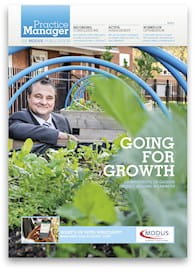
THEY say that no matter what our role is, we are all project managers – but no one ever says that we are all equally good at it. The reality is that many projects fail to complete on time and on budget, and some may struggle even to get off the ground.
In considering how to be an effective project manager, it is useful to define very broadly what we mean by a ‘project’. Yes, it includes those specific pieces of work that we are allocated or get caught up in by chance, but it also includes almost every one-off thing we do – installing a new computer system, arranging for a consulting room to be redecorated or even organising a staff party.
All are projects and all can succeed or fail. Here are my top tips for ensuring your project, whatever it may be, will get started, get finished and engender as little stress as possible.
ACTIVELY MANAGE
We know that dinners don’t cook themselves, buildings don’t build themselves and similarly projects don’t manage themselves. All successful projects need to be actively managed, so the first key to success is simply the recognition that you need to take a very active role. This requires effort, attention to detail and often simply being around to ensure the pieces are fitting together as they should.
PLAN WELL
The first step in all project management is the planning stage. To plan well, you need to know where you are going and what is it you are trying to achieve. This may be easy and well-defined, but often it can be vague, especially if you are trying to put into action someone else’s idea. If the latter is the case, then the first job is to formulate a clear objective. As one wag put it: "If you don’t know where you’re going, you’ll probably end up somewhere else."
SMART OBJECTIVES
You may be familiar with the little acronym SMART, standing for Specific, Measureable, Attainable, Relevant and Time-bound. Put simply, unless your objective is SMART – as specific and measureable as possible and with a clear time-line attached to it – it is unlikely ever to come to a successful conclusion. Many people have vague wish-lists – think about your New Year resolutions – but how many of them ever come to fruition? That’s not the approach we should take in successful project management.
RESOURCES, QUALITY AND TIME
In planning and carrying out your work, remember that in every project there is a tension between the amount of time you have to do it, the available resources you have to complete it and the desired quality of the outcome. Change any one of these factors and it affects the others. For example, if you suddenly find you have less time, this may impact upon the quality of what you can achieve, or if the quality cannot be compromised, force you to look for additional resources – often more money or more staff.
TIME MANAGEMENT
Especially with longer and more complex tasks, you may have to put particular efforts into keeping the project running on time. It may help to use scheduling tools such as Gantt Charts and approaches such as critical path analysis, but most of the time it involves much simpler strategies. These invariably include making sure you have the bigger picture in mind while also attending to the details, and simply keeping a close eye on the project, especially if you are relying on other people to help out.
MANAGEABLE PARTS
How do you eat an elephant? One spoonful at a time. No matter how big and daunting the task in hand is, by breaking it down into smaller and smaller steps we can tackle just about anything. And if you’re working in a team, having a series of discrete tasks is always easier to allocate and monitor.
OPPORTUNITY COSTS
Sometimes when we are planning a project, we delude ourselves into thinking something or someone we plan to use is free, just because the resource is already in place and available. But someone is paying for that piece of equipment or that staff member, so to cost a project accurately we need to recognise this and be familiar with the notion of opportunity costs. What else could you have spent that money on, or used that equipment for, or had that staff member working on?
BE REALISTIC
This last point is probably the most important and tends to come with experience, often painfully so. The knowledge that almost everything you’ll ever do will take longer, use more resources and cost more than you originally planned will allow you to make better, more realistic plans and ultimately help you complete your projects.
Allan Gaw is a writer and educator in Scotland
This page was correct at the time of publication. Any guidance is intended as general guidance for members only. If you are a member and need specific advice relating to your own circumstances, please contact one of our advisers.
Read more from this issue of Practice Manager

Save this article
Save this article to a list of favourite articles which members can access in their account.
Save to library
